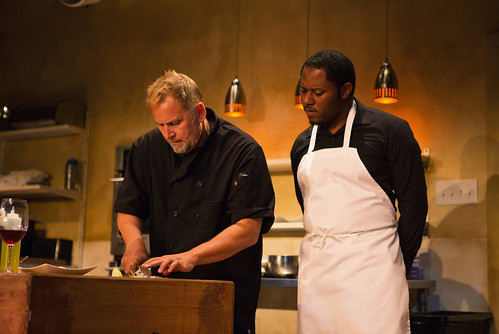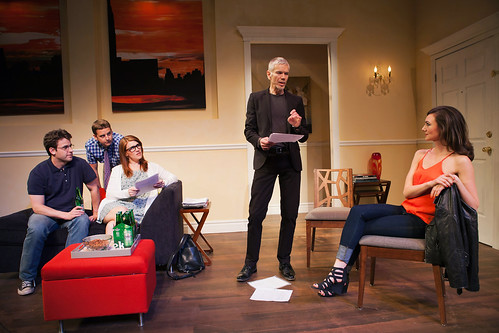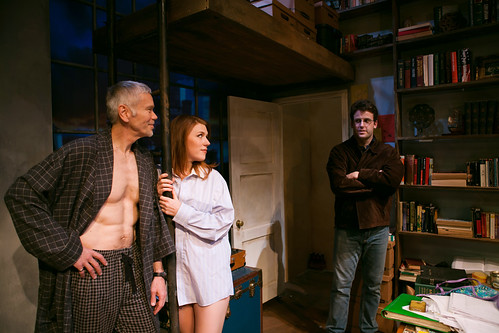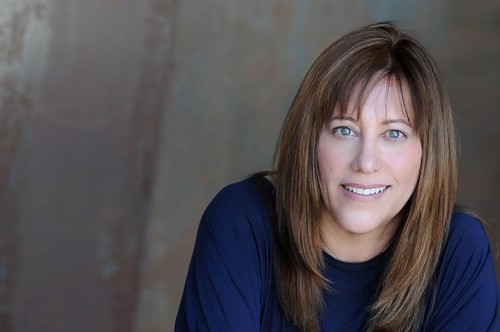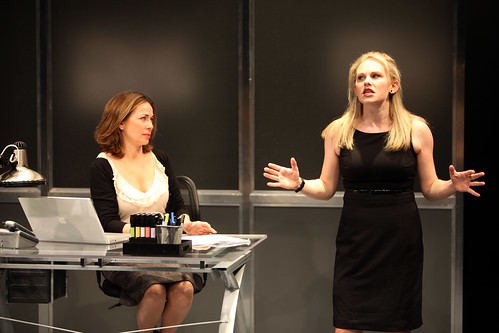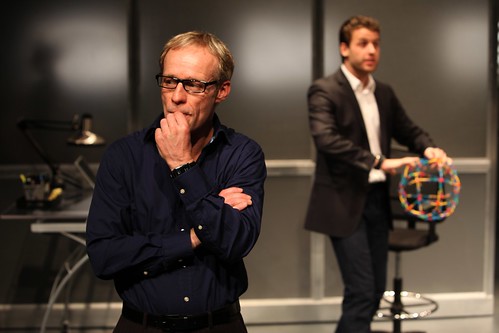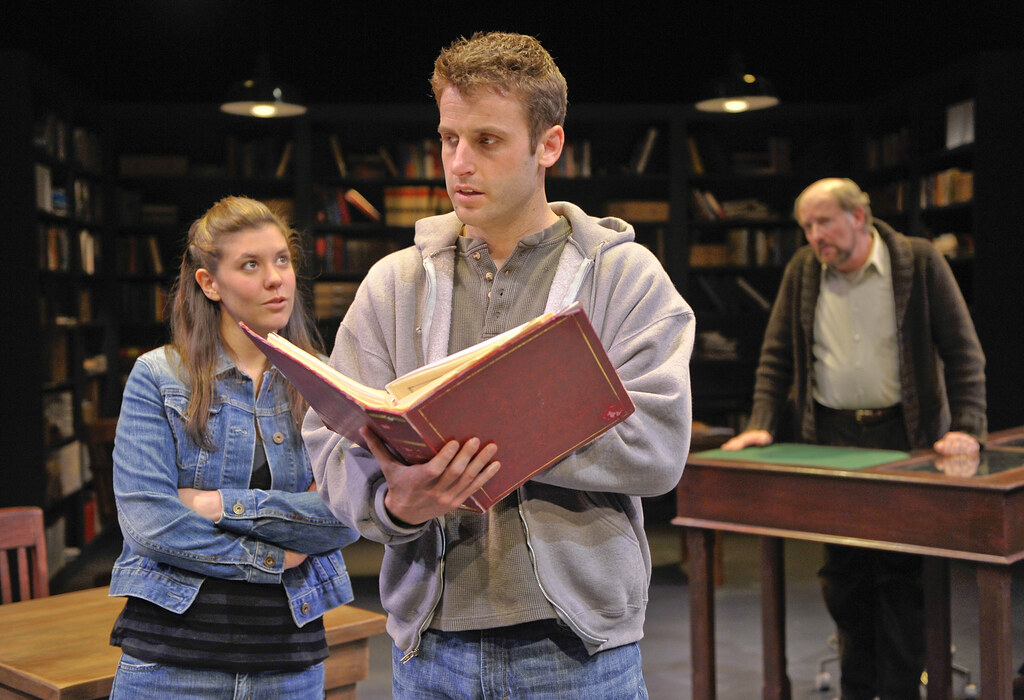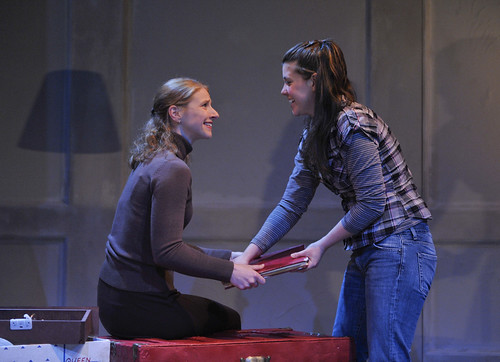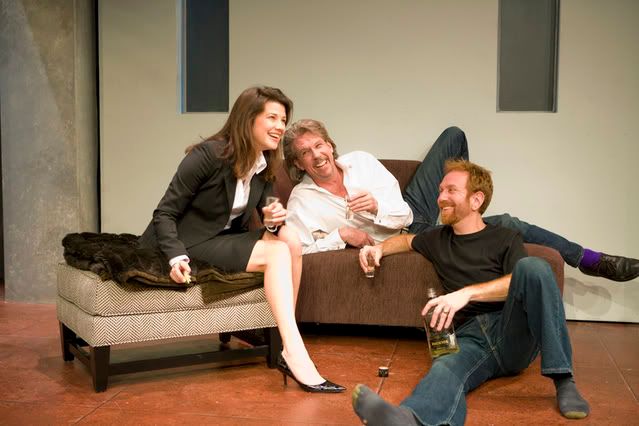The theater event that shook my year and reverberated through it constantly didn’t happen on Bay Area stage. Like so many others, I was blown away by Hamilton on Broadway in May and then on repeat and shuffle with the original cast album (and, later in the year, the Hamilton Mix Tape) ever since. Every YouTube video, official or fan made, became part of my queue, and checking Lin-Manuel Miranda’s incredibly busy Twitter feed has become a daily ritual. Hamilton is everything they say it is and more. It’s the gift that keeps on giving, the score that continually reveals its brilliance and a bond with friends, family and other fans. In a year in which hope seemed to physically shrivel and evaporate, Hamilton keeps bolstering my faith in art, in theater, in musical theater, in theater artists and even in this messy country of ours. The show has yet to fail in delighting, surprising or moving me, and I plan to continue testing that limit.
Now that Hamilton is a bona fide phenomenon, the conquering expansion is under way. There’s a company wowing them in Chicago with another set for San Francisco (and later Los Angeles) next spring as part of the SHN season. If you don’t already have your tickets, good luck. I’ll be entering the ticket lottery daily because there’s no conceivable way I can get enough of this show.
Shifting focus back home, theater in the San Francisco Bay Area continues to be a marvel, which is really something given the hostile economic environment arts groups are facing around here. I saw less theater this year (while Theater Dogs celebrated its 10th anniversary in August) and took some time off to reevaluate my theater reviewing future. The upshot is I’m still here, still reviewing but on a more limited scale given the demands of my day job. I’ve been writing about Bay Area theater for 24 years (25th anniversary in September 2017!) and love it too much to stop, and that’s the truth. With so many extraordinary artists here and an ever-intriguing roster of visitors, who could stop trying to spread the good word?
With that in mind, here are some of my favorite Bay Area theatergoing experiences of 2016. (click on the show title to read the original review)
A good year for San Francisco Playhouse
Making notes about the most memorable shows I saw this year, one company kept coming up over and over: San Francisco Playhouse. Talk about hitting your stride! They kicked off 2016 with a mind-blowingly creepy show, Jennifer Haley’s The Nether, a drama about virtual reality that blurred all kinds of lines between theater, audience, reality and fantasy. Thinking about this production, expertly directed by Bill English and designed by Nina Ball, still gives me the shivers. Two other shows made a powerful mark on the SF Playhouse stage as well: Andrew Hinderaker’s Colossal, a blend of drama and dance in the service of exploring football and masculinity, and Theresa Rebeck’s Seared about a hot little restaurant and its chef and loyal staff. I could also add the Playhouse’s musicals, which continue to grow in stature and quality as seen in City of Angels and She Loves Me. But I’ll just give those honorable mention so that one theater doesn’t take up half of this list.
Local playwrights shine
Let’s hear it for our local scribes who continue to devise startlingly good shows. Each of these writers should inspire any prospective audience member to check out whatever they happen to be working on.
Christopher Chen has a brain that knows no boundaries. His Caught, part of Shotgun Players’ stunning repertory season, was like an intellectual amusement park park ride as fun as it was provocative and challenging. Chen had another new show this year, but on a different scale. His Home Invasion was given small productions in a series of people’s living rooms as part of 6NewPlays a consortium of six writers creating new work under the auspices of the Intersection for the Arts Incubator Program. Directed by M. Graham Smith the play is set in a series of living rooms (how appropriate), but its realm expands way beyond its setting. The concepts of multidimensionality that come up in the play truly are mind altering, and what an extraordinary experience to get to watch such amazing actors – Kathryn Zdan and Lisa Anne Porter among them – in such an intimate space.
Peter Sinn Nachtrieb also took us into a home with a new play this year, but this home was built primarily in the theatrical imagination (and in the wondrously impressionistic sets by Sean Riley). In A House Tour of the Infamous Porter Family Mansion with Tour Guide Weston Ludlow Londonderry, Nachtrieb and his solo actor, the always-remarkable Danny Scheie, the audience got to play tourists as we moved from room to room in the most unique historical home tour imaginable. Commissioned by Z Space and written expressly for Scheie, this experience was so delectable we can only hope it will return for another tour of duty.
Not only is Lauren Gunderson a wonderful playwright, she also happens to be the most produced living playwright in the country this season. One of the reasons for that is the new play she wrote with Margot Melcon, Miss Bennett: Christmas at Pemberley, a sequel to Pride and Prejudice that delivers a feel-good Christmas experience with snap rather than sap (especially in the top-notch Marin Theatre Company production). Gunderson’s love of science and literature combined with her grace, intelligence, good humor and prodigious dramatic talents should continue yielding marvelous results for years to come.
Big drama at Thick House
Two companies in residence at Thick House continually do fantastic things on its small stage. Crowded Fire hit two shows out of the proverbial ballpark this year: Young Jean Lee’s The Shipment and Jonas Hassen Khemiri’s I Call My Brothers. Both plays explore different aspects of race, religion and being an outsider in this country, and both were powerful in their of-the-moment relevance and dramatic impact. The other company in residence at Thick House that dazzled is Golden Thread Productions, whose Our Enemies: Lively Scenes of Love and Combat by Yussef El Guindi delivered action and depth in its exploration of what it means, among other things, to be Muslim in this country. It should be noted that a significant part of what made both I Call My Brothers and Our Enemies so good was the work of the marvelous actor Denmo Ibrahim.
A dazzling finale for Impact
This one makes me as sad as it does happy. As it wound down its work at LaVal’s Subterranean, Impact Theatre unleashed yet another brilliant Shakespeare reinvention. This time it was The Comedy of Errors meets Looney Tunes, and the results in director Melissa Hillman’s production were inventively hilarious and so spot-on it’s a wonder Yosemite Sam or Bugs Bunny didn’t make cameo appearances. Here’s hoping that Impact returns in some form or another sometime soon.
My favorite play this year
Let the record show that this year Berkeley Repertory Theatre was home to two of my least favorite theater experiences (a ponderous Macbeth starring Frances McDormand and a disoncertingly disappointing For Peter Pan on Her 70th Birthday) as well as my favorite local theater experience: Julia Cho’s Aubergine. Sensitively directed by Tony Taccone, this deeply moving play about families, loss and growing up was rich in quiet beauty and full of performances that allowed the understated to just be. Food and memory played a big part in the drama, but it really came down to who we are within the defining experiences of our parents and our own mortality. A gorgeous production of a gorgeous play that said as much in silence as it did in sound.


